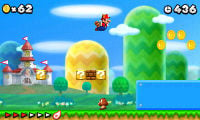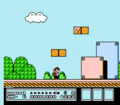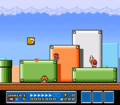P-Meter
- "Power Meter" redirects here. For the health meter in Super Mario 64 and Super Mario 64 DS with the same name, see Health Meter § Super Mario 64 / Super Mario 64 DS.
The P-Meter, also known as the Power Meter[1] (or power meter),[2] is a type of meter first seen in Super Mario Bros. 3. The meter gets filled up gradually as Mario (or Luigi) runs without stopping. Once the Power Meter is fully charged and the "P" icon starts flashing, Mario can run at full speed, indicated by him sticking his arms out to the sides. If Mario is Raccoon Mario or Tanooki Mario, he also has the ability to fly if the Power Meter is full. However, in both of those forms, the Power Meter always empties itself after a while. If Mario is flying, he stops and descends; otherwise, he slows down. The Power Meter also empties itself if Mario crouches, turns around, or runs into a wall, though it stays full if he jumps while running while he is not Raccoon or Tanooki Mario. If Mario uses a P-Wing before entering a level, the Power Meter is full for the rest of the stage or until Mario takes damage, grabs a non-flight-based power-up, or loses a life, meaning he can fly for an unlimited amount of time.
In the Super Mario All-Stars version and Game Boy Advance version of Super Mario Bros. 3, instead of its original black-and-white appearance, the Power Meter is colored orange when filled up, and the "P" icon flashes red. In the latter port, the Power Meter appears only within levels. It stays full if Mario keeps running, even in Raccoon or Tanooki form, meaning that he can extend his flight time by landing and taking off again while the "P" icon flashes. It also beeps in a lower pitch if Mario is not in either of those forms. It can be halved by the cyan switch card, and Power Meter Blocks make it charge faster.
The P-Meter returns in New Super Mario Bros. 2, appearing only when Mario is Raccoon Mario (or White Raccoon Mario), with a few visual changes. The "P" icon is replaced by a red-outlined P-Wing icon (which flashes golden), the meter itself is colored red when filled up, and the meter visually empties as Mario flies, unlike in Super Mario Bros. 3, where the meter looks full until Mario stops flying. Aesthetics aside, the P-Meter works as it did in Super Mario Advance 4, though the White Raccoon form makes it charge faster.
The P-Meter returns in Super Mario Maker, Super Mario Maker for Nintendo 3DS, and Super Mario Maker 2, but it appears only in the Super Mario Bros. 3 style, working as it did in that game. In the version 3.0.0 update of Super Mario Maker 2, if Frog Mario is holding an object, he has the ability to run on water if the P-Meter is full.
While the P-Meter does not appear in Super Mario World or that game's style in the Super Mario Maker games, the underlying mechanics do, including Mario sticking his arms out to the sides at full speed.
Gallery[edit]
The original Power Meter in Super Mario Bros. 3
Names in other languages[edit]
| Language | Name | Meaning | Notes |
|---|---|---|---|
| Japanese | パワーメーター[3] Pawā Mētā |
Power Meter | |
| Pメーター[?] P Mētā |
P Meter | ||
| Dutch | P-meter[?] | - | |
| French | jauge P[?] | P gauge | |
| German | P-Anzeige[?] | P-Display | |
| Italian | Misuratore di potenza[4] | Power meter | |
| Barra Potenza[5] | Power Bar | ||
| Indicatore di potenza[6] | Power indicator | ||
| Barra dell'energia[7] | Energy/Power bar | ||
| Russian | «P»-метр[?] «P»-metr |
P-meter | |
| Шкала «P»[?] Shkala «P» |
P gauge | Super Mario Maker 2 | |
| Spanish | indicador P[?] | P indicator |
References[edit]
- ^ 1990. Super Mario Bros. 3 instruction booklet. Nintendo of America (American English). Page 16.
- ^ "As Tanooki Mario or Raccoon Mario, run until the P on the power meter at the bottom of the screen lights up, then press
 repeatedly to fly." – Super Mario Bros. 3 Wii Virtual Console manual.
repeatedly to fly." – Super Mario Bros. 3 Wii Virtual Console manual.
- ^ 1988. スーパーマリオブラザーズ3 (Sūpā Mario Burazāzu Surī). Nintendo (Japanese). Page 15.
- ^ Super Mario Bros. 3 Italian instruction booklet. Page 8.
- ^ Super Mario Advance 4: Super Mario Bros. 3 European instruction booklet. Page 110.
- ^ Super Mario All-Stars - 25th Anniversary Edition Italian instruction booklet. Page 23.
- ^ Super Mario Bros. 3 Italian e-manual. Sections 1 and 5.




